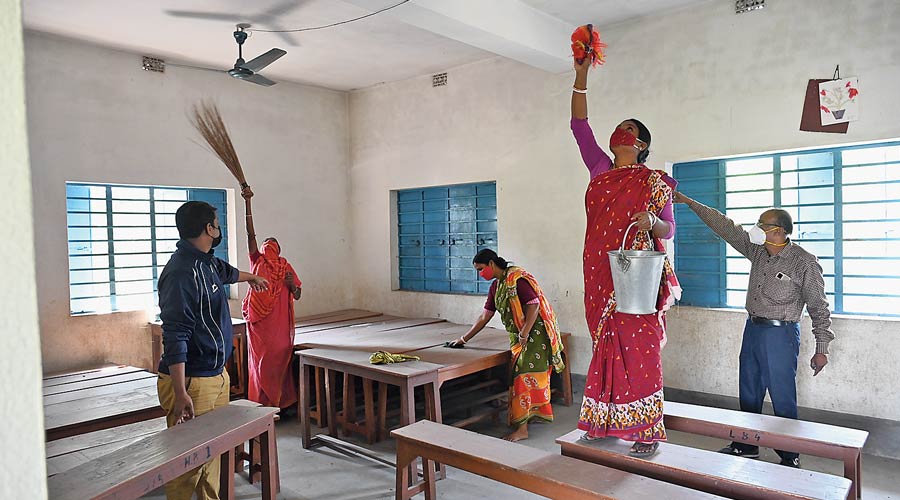The Birbhum district primary school council (DPSC) has directed its teachers not to “overburden” children with syllabi and to make assessments on “learning gaps” during the pandemic-induced lockdown.
The directive comes a day ahead of the resumption of in-person classes for all students from Wednesday.
“It is a fact that a large number of students, mainly from remote rural pockets or first-generation learners’ families, have fallen behind… We have instructed our teachers to find out the level of learning of students irrespective of classes. Teachers will assess the gaps and we would likely start classes over the weekend to meet these gaps in learning,” said Pralay Nayek, chairman of the DPSC in Birbhum.
Students of Classes I to VII will begin attending classrooms from Wednesday, reverting to the pre-Covid situation following two years of closure starting in March 2020.
Sources in the education department said there were 50 lakh students enrolled in Classes I to VII in government schools across the state and 12,500 high schools and 56,000 primary schools will reopen on Wednesday.
Several experts who have researched education in the primary stage have repeatedly suggested that teachers should begin at that point where students “seem stuck”.
Nobel laureate Abhijit Vinayak Banerjee, who was virtually present at the release of the Annual Status of Education Report (ASER) for rural Bengal, 2021, last week, had stressed on that point.
“Beyond the so-called syllabus, now the teachers have to teach the students from the point where they are standing at present,” said the Nobel laureate at the release of the ASER, which revealed that the percentage of students in Class I who could read had dropped to 66.3 per cent among those surveyed in 2021, compared to 73.2 per cent in 2018.
The Pratham Education Foundation and Liver Foundation, West Bengal, were partners in doing the survey and bringing out the report.
A study by a group of social researchers and teachers released in September last year showed 28 percent of pupils in government-run primary schools were disconnected from academic activities. “All teachers, especially at the primary level, have to prepare an assessment report for each of the students to find out their stage of academic activities and uplift him or her to the present level,” said Kumar Rana, a social researcher who played a key role in the study.
“There are two types of gaps: first, students had learnt a bare minimum during this period and secondly, a large number of students had gone out of their schools as they had started working with their fathers or in the case of girls, had got married. My request and hope is that the government will play a positive role in both cases,” said educationist Pabitra Sarkar.
During the closure of schools, many individuals and organisations in many Bengal districts had taken up initiatives to start classes for rural children. Liver Foundation, West Bengal, started a drive termed Paralekha in which it involved women from self-help groups as moderators to improve basic learning skills of students in remote rural pockets.










